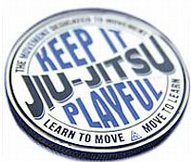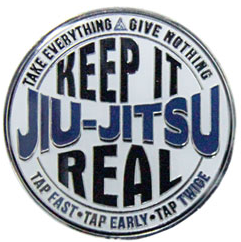I feel fortunate to live in a culture that values freedom of expression as a basic human right. Individuals can express themselves openly and freely through speech, writing, art, movement...you name it.
The personal freedom that enables me to write this blog also empowers me and other women to dress the way we please, whether we choose to wear a burka or a thong. Some people choose to dress conservatively in public and some people choose to dress provocatively. Some people choose to express their sexuality through their outward appearance. Those who do so are not asking to be harassed, groped, raped, or otherwise creeped on. Harassment, of course, is the fault of the harasser alone and not the victim.
Provocative photos are abundant on the internet. Among them are the widely circulated photos of jiu jitsu and MMA women posing in sexualized ways, including this recent photo of Kyra Gracie:
This is just the latest example of sexualized photos of grappling women on the mats or in gis. Here are a few others:
While the first photo has been getting a lot of recent attention, images like that one are nothing new. These photos are all over the internet and social media, and unless you're living with the Amish, you really can't escape them.
Certainly, it is a woman's right to pose however she wants for photos. That means she can pose provocatively if she so chooses. Some jiu jitsu women may even benefit professionally and financially from the media exposure that comes from these sexy photos. No laws are being broken by these images and no one is being directly hurt by them. So what's the big deal?
While these photos may seem harmless to outsiders, jiu jitsu women have another opinion. While I cannot speak for everyone, the general reaction to these images from women in my training circle has been negative. I share that sentiment. We are not denying the rights of women to dress and pose as they please. Nor are we blaming the women for the creepy and obnoxious posts that some men are making in response to these images. But the general consensus from the women I have spoken to is that female martial artists do not like being represented this way. We understand that sex sells and that having a sexy image can increase one's marketability. We understand that posing provocatively can gain exposure for an athlete beyond what one might earn through athletic accomplishments alone. Yet, images like these undermine the culture that many jiu jitsu women are trying to foster.
Women work hard to earn respect on the mats and to be taken seriously as training partners. Jiu jitsu may be an intimate sport, but the mats are the last place that we should worry about being sexualized, especially since many women come to jiu jitsu in the first place to learn self-defense. We deserve the same security while rolling that men take for granted - knowing that if we throw up a triangle, that our partner's mind is 100% "I better defend this or I'll get choked unconscious" and 0% "This is hot."
Julie Johansen wrote a blog
BJJ and Gender: Group Responsibility vs Individual Freedom, which examines our right to act as individuals vs. our responsibility to positively represent the groups that we belong to. We all have the right to make our own choices and to express ourselves the way we please. But whether we like it or not, our actions can affect not only our own images, but the images of the groups that we belong to, especially when we belong to a minority group. This got me thinking about social psychology.
Humans naturally sort items into groups, in order to find patterns and better make sense of our environment. The way we sort people is called social categorization. We naturally classify each other on the basis of sex, race, age, occupation, and various other attributes. This process is adaptive because by discovering patterns, we are able to think and act more efficiently, freeing our cognitive resources for other tasks. On the downside, it can lead to harmful stereotyping,
Groups that we belong to - our own gender, nationality, religion, etc - are known as our ingroups. Groups that we do not belong to are outgroups. The process of outgroup homogeneity is the process by which we naturally assume that members of outgroups are more similar to each other than members of our ingroups are. The racist cliché "people of X ethnicity all look the same" is an example of this. Members of the majority class are easily able to find differences among members of their own group, while they automatically lump members of other groups together.
This process extends to attributes beyond race. A while back, a student from another martial arts school tried a class at my school and behaved like a jackass. When that school was later brought up in conversation, I said "Those guys are assholes." I immediately caught myself. I had met one guy from that school and he behaved like an asshole. It was unfair to extend this trait to other members of that group. Yet, that was what I had naturally done. The error in thinking was mine, but this individual's bad behavior had reflected negatively on the image of his entire school.
As a minority group in jiu jitsu, women are the outgroup to most jiu jitu practitioners. Consequently, as diverse as we may be, we get lumped together at least subconsciously.
When people look at the sexy poses pictured above, it is fair to assume "these women want to be noticed sexually." Not raped, molested, or harassed...but it is fair to say that they want to be noticed in a sexual way. However, it is wrong and harmful to assume that "jiu jitsu women" want to be noticed in this same way. Most, in my experience, do not want that on the mats. We want to be noticed instead for our hard work, toughness, cooperation, and general ability to kick ass. Which is why we grumble about these photos.

























